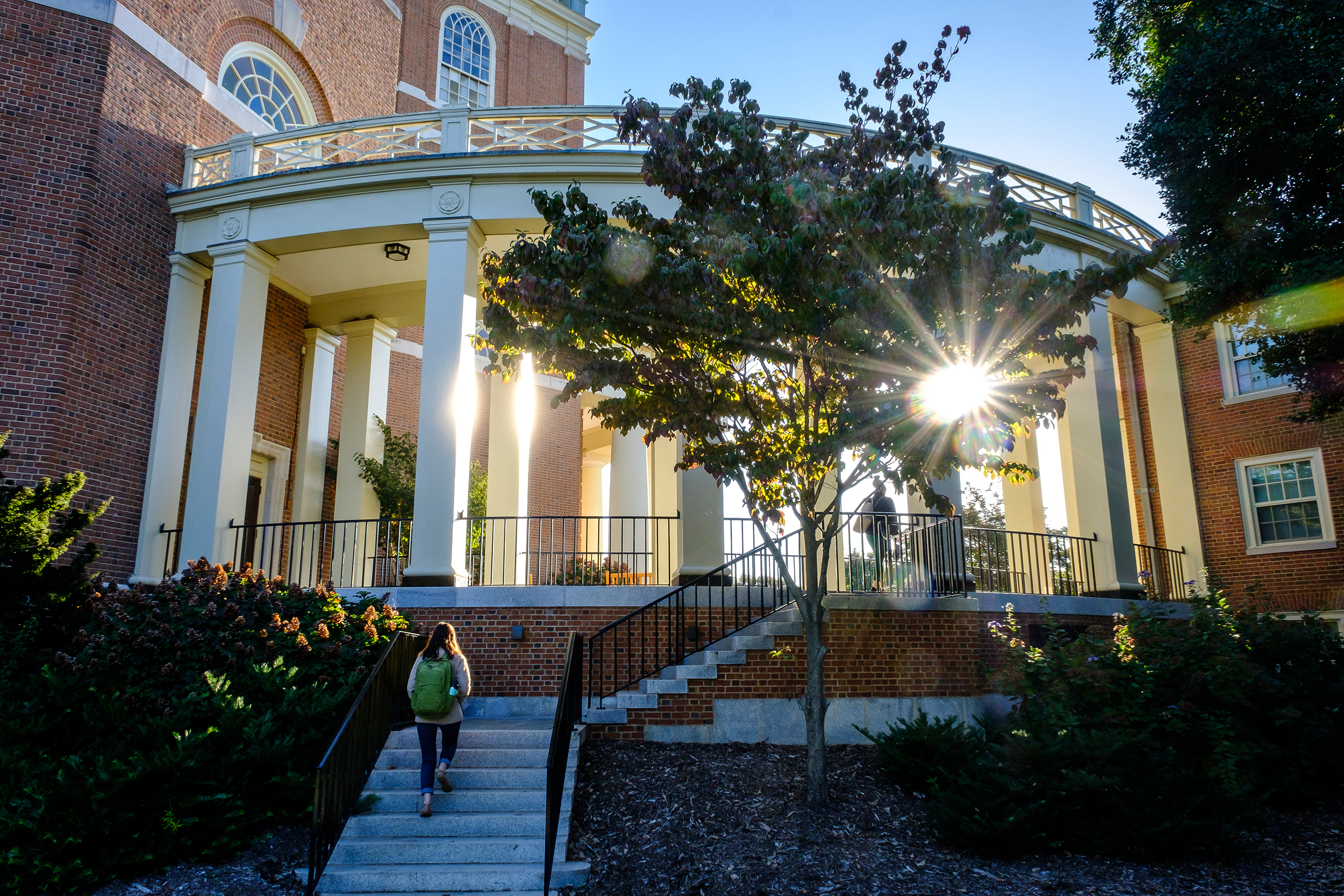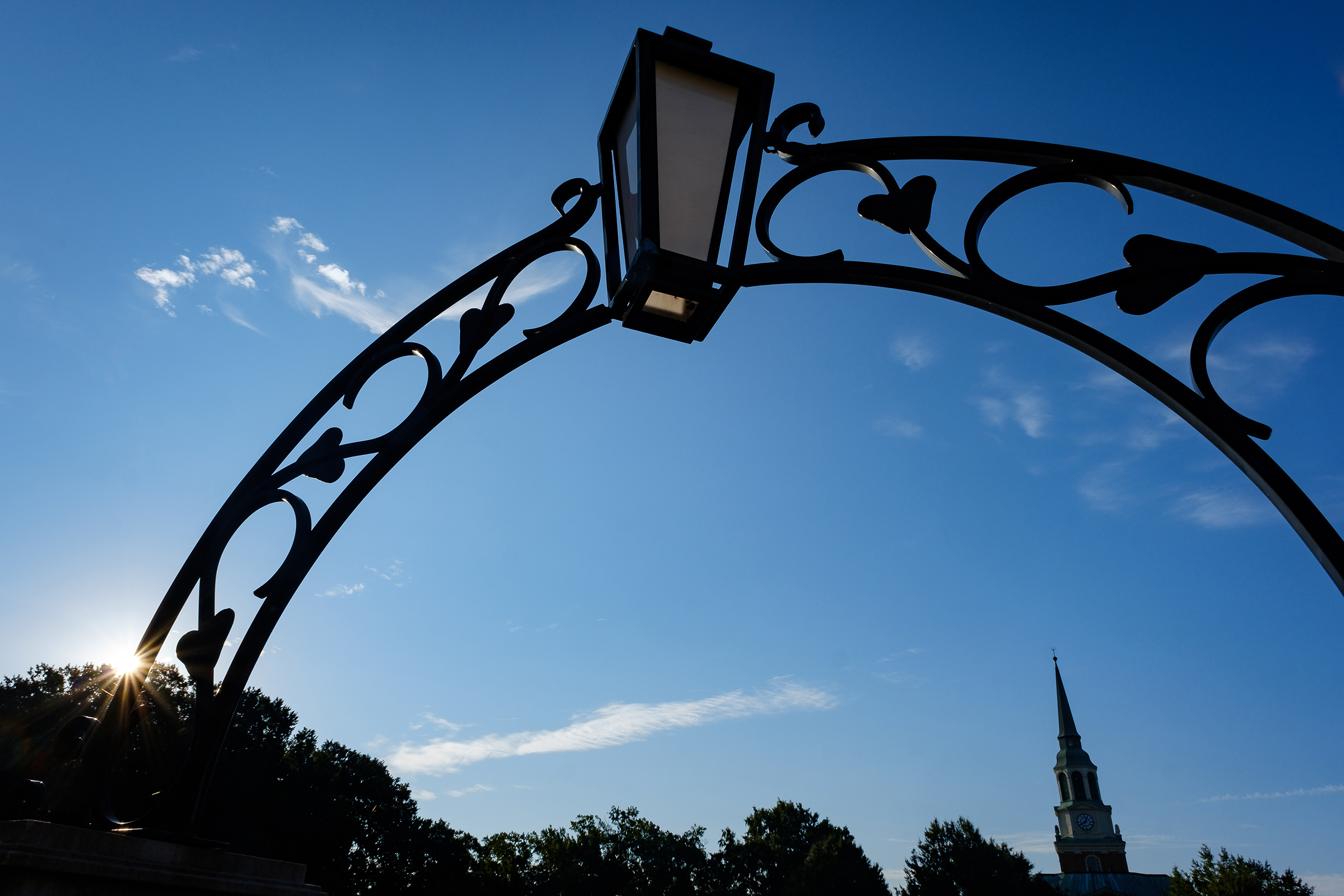Wake Forest Marks Second Year of Undergraduate Plan
 With the start of fall classes, Wake Forest University marks the second year of an extensive campaign to enrich the learning experiences of undergraduates through new technology, classes, faculty and more.
With the start of fall classes, Wake Forest University marks the second year of an extensive campaign to enrich the learning experiences of undergraduates through new technology, classes, faculty and more.
Take, for example, Olga Valbuena’s new Shakespeare seminar for freshmen this fall. Rather than taking students to London’s new Globe Theatre, she will bring the replica of Shakespeare’s theater to them. Aided by the university’s new videoconference facilities, the students will enjoy three electronic exchanges with Globe Theatre staff, including one of the world’s most renowned experts on staging Shakespeare’s plays. With their laptop computers, students will also visit the World Wide Web’s Shakespeare sites and read, hear and see portions of plays on a new CD-ROM.
“It’s clear that technology will change the way Shakespeare is taught,” said Valbuena. “We now have interactive Shakespeare CD-ROMs designed to augment the printed page. These have multi-text, image and sound capabilities.”
The prevalence of new interactive technology throughout the Wake Forest campus today is probably the most conspicuous feature of the initiative known originally as the Plan for the Class of 2000 but now simply called the undergraduate plan. The plan, which has gained national attention, actually contains about three dozen features. In part, it has led to the hiring of more faculty, the introduction of specially-designed freshman seminars such as Valbuena’s, the annual presentation of a series of events developed around a common theme and the creation of new study-abroad scholarships.
Last fall’s freshmen, the first class to benefit from the plan named in their honor, were also the first issued IBM laptop computers by the university. The plan calls for all succeeding freshman classes to receive the computers, as well. By 1999, all Wake Forest students will be using the computers, known as IBM ThinkPads.
On Monday, Aug. 25, this fall’s freshmen will pick up their computers during a distribution in Reynolds Gymnasium. More than half of the approximately 975 freshmen arranged to receive the computers at home before they arrived for orientation. It is estimated that about 400 computers remain to be picked up at the gym.
This fall’s computer distribution will differ from last year’s in one special way.
“We have made arrangements for freshmen and sophomores to receive individual Lexmark inkjet color printers,” said Jay Dominick, Wake Forest assistant vice president for information systems. “We’ll distribute them at the gym Aug. 25.” Last year, university laser printers were set up in freshman residence halls for use with ThinkPads.
“It became clear during the course of the previous academic year that it would be more convenient and efficient for students to have their own printers,” Dominick explained. “We included sophomores in the printer distribution this fall since they needed printers to accompany the ThinkPads they received last fall.”
Although Wake Forest has occasionally made such adjustments in the undergraduate plan since its launching, the plan is progressing on schedule and without major hitches, according to Wake Forest provost David G. Brown.
“In its first year, we were able to put into action several key initiatives of the plan,” said Brown, who has played a major role in developing and carrying it out. “And we are on track with features that are scheduled for the second year.”
“As far as the technology goes, we have made extraordinary steps in a short time,” said Brown. “All classrooms and residence halls, and many of the seats in the campus’s classrooms, have fast connections to the university’s computer network.”
An economist who takes advantage of the technology in his own classes, Brown is especially pleased that faculty are “eager to explore ways to enhance their classes with computers.”
To support the faculty’s interest, the university has hired computer specialists for each academic building and employed students to assist faculty members in incorporating computer enhancements in classes. It also set up the Computer Enhanced Learning Initiative (CELI). Led by a different professor each semester, CELI is committed to coordinating faculty exposure to new ways of teaching with computers.
Through his own classroom experiences, Brown has seen firsthand the benefits of computer-based learning for his students.
“They are learning to collaborate more and they are becoming more independent learners with access to their own sources of information,” Brown explained.
Technology adoption is not the only part of the plan that is on track. One of its major components was the introduction of first-year seminars, which are small classes designed particularly to strengthen the critical and analytical thinking skills of freshmen. Approximately 70 will be offered this year, with no more than 15 students in each. A similar number were taught last year. Several, such as those taught by Valbuena and Brown, use technology.
The plan is also providing the additional faculty it promised. Eventually, 40 additional faculty will be hired. More than half have joined the university already, including several this fall.
The new seminars and the additional faculty play an important part in meeting the plan’s goals of emphasizing individualized instruction, small classes and mentoring by senior faculty.
Last year marked the debut of the plan’s call for adopting an annual series of events built around a particular theme. During the 1996-97 academic year, Wake Forest celebrated the Year of the Arts. An address by famed writer and Rabbi Harold Kushner on Sept. 4 will kick off the university’s Year of Religion in American Life. The yearlong focus on matters of faith will bring special classes, events and activities to the campus.
Next summer, students will be able to study abroad with the support of 175 merit scholarships established by the plan. Next fall, 150 merit fellowships also created by the plan will enable juniors and seniors to work more closely with faculty mentors on research and other projects.
Categories: Campus Life, Experiential Learning, Wellbeing
Media Contact
Wake Forest News
media@wfu.edu
336.758.5237



